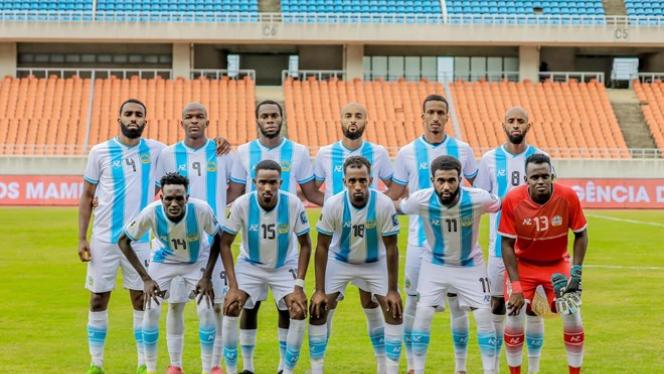Thursday 21 November 2024
Somalia withdraws from continental football tournament

Every time Somali football seems poised for progress, it inevitably takes a step backwards, creating the frustrating sense that true change may never come. Recently, disappointing news broke that Somalia will no longer compete in the African Nations Championship (CHAN), a decision that left many fans heartbroken, particularly those who had hoped to see their national team participate in such a prestigious continental tournament.
In recent years, the Somali national team has been largely composed of players based abroad, limiting opportunities for local talent to represent their country on the international stage. This is not an issue unique to Somalia, as nearly 200 of the 630 players registered to participate in the Africa Cup of Nations (Afcon) 2023 were born outside Africa. Kalidou Koulibaly and Riyad Mahrez, who lifted the Afcon trophy for Senegal in 2021 and Algeria in 2019, respectively, were both born in Europe. Morocco, Equatorial Guinea and Democratic Republic of Congo draw most heavily on their diasporas. This is why the African Nations Championship holds such unique appeal—it is specifically designed for African players competing within their own national leagues. The tournament rules stipulate that each team must consist solely of players active in their domestic leagues.
This is not an issue unique to Somalia, as nearly 200 of the 630 players registered to participate in the Africa Cup of Nations (Afcon) 2023 were born outside Africa.
Somalia was set to face Burundi in a two-legged qualifier, with the winner advancing to play one of the host nations, Uganda, for a chance to participate in the final tournament. However, the matches were cancelled after the Somali Football Federation (SFF) announced that it could not participate due to financial constraints. While financial limitations are a valid reason for withdrawal, given the significant costs of travel, player accommodation, and other logistical expenses, the question still arises: why, with 52 out of 54 African nations able to manage participation, is Somalia still struggling with these challenges?
The Somali National League has grown in stature in recent seasons, raising hopes among players and fans about Somalia's prospects in the tournament. CHAN would have offered homegrown Somali players the chance to showcase their talent on a major stage. However, with the withdrawal, that opportunity has been lost.
Somali international Abdirahman Mahmoud Jama, who would have been called up to play a major role in the tournament, shared his frustration with Geeska. “It’s very disappointing,” he said. “As a local player, we have a lot of young, talented players in the league, and I believe we could have achieved a positive result against Burundi.”
The 23-year-old further explained the emotional toll of the decision: “Somalia’s withdrawal from CHAN has made many players lose faith in the federation and Somali football as a whole.”
“Our dream is to be part of the senior team, but whenever the chance comes to fulfil that dream, our federation takes it away,” says Jama.
This sentiment is widely shared within Somali football and marks a major setback for a country that has made incredible strides in recent years. The progress achieved now feels overshadowed by this latest disappointment. For the first time in years, there was genuine optimism—and even an unfamiliar trace of expectation—that Somalia could secure a strong result and advance to the next stage.
The Somali federation cited financial constraints as the reason for withdrawal, but how credible is this explanation? The SFF receives the majority of its funding through FIFA’s Forward programme, specifically designed to help member associations build football infrastructure and expand opportunities in their countries. FIFA President Gianni Infantino even praised Somalia’s use of these funds in a recent interview, highlighting the construction of a new headquarters and noting that the SFF had made “very good use of the programme”. Infantino also emphasised the importance of using these resources to create more playing opportunities for Somali national teams.
The Somali federation cited financial constraints as the reason for withdrawal, but how credible is this explanation? The SFF receives the majority of its funding through FIFA’s Forward programme, specifically designed to help member associations build football infrastructure and expand opportunities in their countries.
With this level of support and encouragement from FIFA, the decision to withdraw raises important questions. If funds are being managed effectively and resources are available, what remaining barriers prevent Somalia from fully participating?
The core issue lies in the lack of financial backing from the Somali government and local business sponsors. While FIFA’s funding provides a significant boost, it is intended to cover more than just the national team—it is also allocated for league development, the introduction of women’s football, and other grassroots initiatives. With such diverse priorities, the Somali Football Federation (SFF) faces difficult decisions about how to allocate its limited resources. In fairness to the federation, it operates on a modest budget and must prioritise certain initiatives, which sometimes leads to tough choices—such as sacrificing participation in tournaments like CHAN.
However, the federation’s decision, while understandable, highlights deeper, long-standing issues that continue to plague Somali football. Despite recent progress, these challenges persist. The reality is that every other African nation, except one, has managed to overcome similar obstacles to compete in major tournaments like this one. This contrast prompts critical reflection on the structural and organisational hurdles that remain, even as other nations find ways to make it work.
CHAN is not the only tournament Somalia has missed this year. Earlier, the U20 team was set to compete in the Africa Cup of Nations qualifiers but also failed to participate. This pattern of missed opportunities underscores a more significant problem that requires urgent attention. The Somali Football Federation has a responsibility not only to the players, who dream of representing their country, but also to the fans, who long to see their team perform on the international stage. The SFF must find ways to address these shortcomings, ensuring that the Somali team can consistently participate in—and succeed in—these important tournaments.







